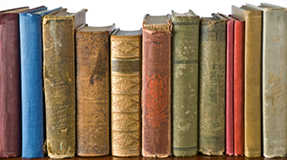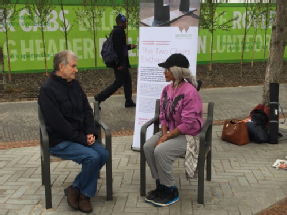Impact
Engaging public beneficiaries with our research is central to the ethos of Warwick's Modern Languages departments. Our research has enriched public experience and knowledge of culture and cultural heritage, informed policy debate, inspired new forms of artistic expression, enhanced teaching and learning in non-HE levels of education, stimulated tourism, and helped libraries and archives to better understand and present their collections.
Impacts arising from our research include:
- Informing the work of cultural organisations and institutions in the UK and Europe.
- Improving libraries, archives and databases, and the knowledge base of their staff and users.
- Enriching primary, secondary and further education.
- Enhancing understanding of the knowledge and experience of cultural heritage in the general public.
Reading Aristotle in Italian improves library catalogues
 Dr David Lines and Professor Simon Gilson
Dr David Lines and Professor Simon GilsonItalian Studies
The Renaissance was one of the most dynamic intellectual and cultural periods in the history of Europe. The invention of the printing press meant that the number of books proliferated, becoming available to more people than ever before. In the process, this took scholarship out of the church and universities, and into the hands of ordinary people.
Just how educated professional (merchants or bankers) or noble men and women read and understood these works which were newly available to them – and how people made, read and circulated books about philosophy in Italian – has been explored by researchers David Lines and Simon Gilson.
They have used this research to inform libraries around the world (such as the British Library and the Accademia Nazionale dei Lincei, Rome) which hold collections of books from this period. The research findings have also been used to improve access to these collections online, spreading knowledge about Renaissance philosophy and its reception.
Performing Portchester's Hidden Stories: Forgotten Napoleonic theatre brought back to life

Dr Katherine Astbury, French Studies
The French Revolution and the Napoleonic Wars loom large in the public imagination, yet, military history often overlooks how writers and artists helped to shape ideas of nationhood at the time. Professor Katherine Astbury’s research uncovered the story of a theatre built in Portchester Castle by French prisoners of war during the Napoleonic wars. The plays they wrote and performed in the keep reveal their experience of those turbulent times. The site has added an entirely new dimension to its history by recreating the theatre, allowing new visitors to learn about the prisoners’ experience for themselves.
In 2017, the launch of a new permanent exhibition about the prison theatre and about the 2000 black prisoners of war brought to Portchester from the Caribbean in 1797 was marked by a performance of a melodrama written by two Parisian prisoners in 1810. In 2021, the keep will host a performance by the National Youth Theatre in collaboration with English Heritage's Shout out Lout project of a new play about the Haiti revolution inspired by another Napoleonic prisoner-of-war drama from 1807, first performed on the prison hulks out in the bay below the castle.
Let’s talk about race: Building resilience and agency within BAME communities through Caribbean art heritage in the UK

Dr Fabienne Viala, Hispanic Studies
Britain is a country that has historically struggled, and continues to struggle, with recognising and reconciling the history of the Empire, its role in the trans-Atlantic slave trade and the legacy of the colonisation. This lack of an open dialogue about race has contributed to today’s discriminatory social practices and the marginalisation of minority communities in the UK.
Dr Fabienne Viala’s work directly addresses this deficit, demonstrating how artistic propositions from Caribbean artists can create space for dialogues about racism and colonial legacies within the UK. Through art exhibitions, performance and schools workshops, Viala’s work has directly impacted on BAME communities by raising awareness of this artistic heritage, creating new spaces for discussions of race, and building resilience and agency within minority communities through artistic practice.
Re-imagining Islam: From Alterity to Empathy

Dr James Hodkinson, German Studies
The 'Re-imagining Islam' project is a multi-dimensional outreach programme, which takes key aspects of James Hodkinson's research into Islam in German history and culture (1770-1918) and finds multiple pathways along which to communicate this material meaningfully to varying non-academic publics.
The programme of events and activities includes public lectures, accompanied by a mobile exhibition, which take place in faith forums, religious and civic centres. The Two Chairs Exchange wing of the project reaches out into secondary schools, were it impacts and enriches the delivery of the Key Stage 4 and 5 curriculum (14-18 year olds) across a number of subjects, including MFL and Religious Studies and stimulates extra-curricular arts projects, and also underpins a sequence of community events and arts projects designed to facilitate cross-community encounters, enhance public debate, cross-community empathy and more nuanced mutual understanding between Muslim and non-Muslim communities in towns and cities across the UK. The project is enhanced by a including a documentary film shot in Vienna, Austria. Read more HERE.
Our impact
Enhancing cultural engagement and understanding
Through public talks, festivals and events we have communicated our research directly to the public. Consultancies to the media, public bodies and businesses have informed the delivery of services to international audiences.
Improving knowledge through libraries, archives and heritage organisations
Working with some of the largest libraries in the UK, Europe and the USA, our research has improved public knowledge about the literary and cultural history of Europe.
Enriching learning and interpreting cultural capital for students and adult learners
From school visits to community courses, our research has introduced new topics and shown pupils how to conduct their own research, inspiring independent learning and expanding the cultural imaginations of learners from school children to adults.
